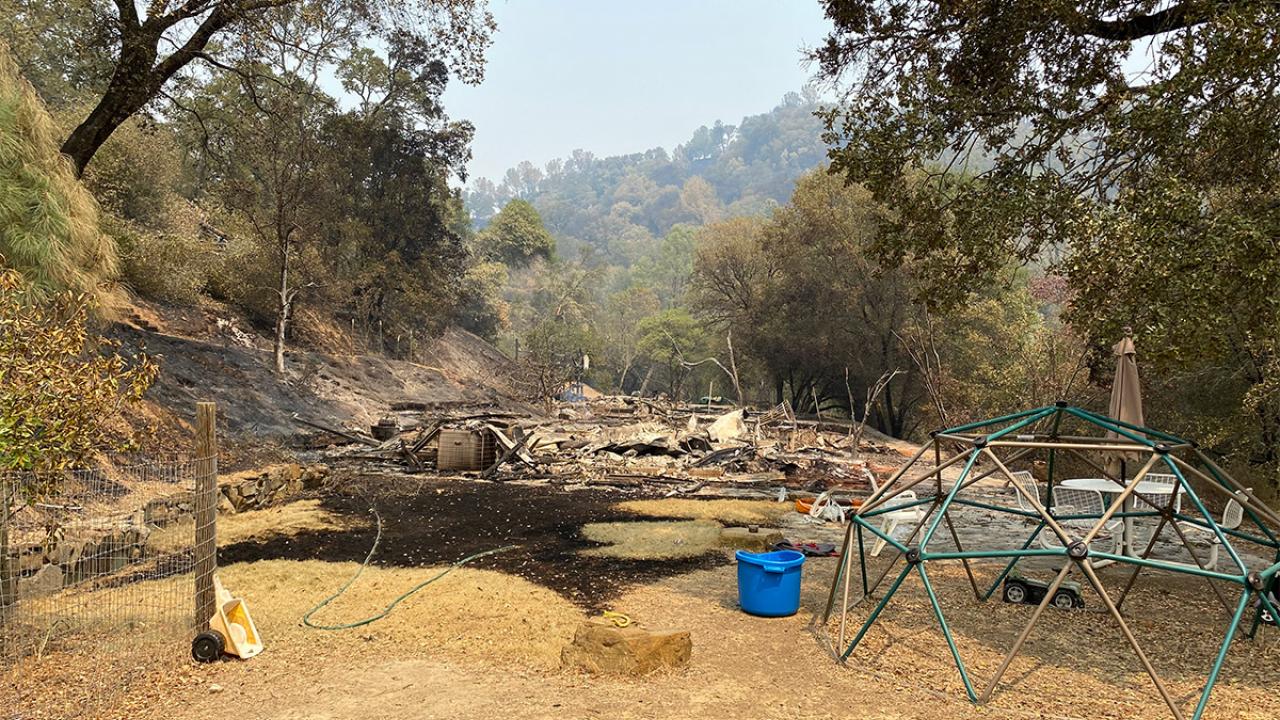Quick Summary
- Reserve director returns today to see house and tent cabins in ruins — and, still standing, the field station
- Says Stebbins Cold Canyon appears to have been completely burned on both slopes
- UC Davis Health and School of Veterinary Medicine caring for fire victims
Updated 4:50 p.m. Aug. 21: The UC Davis Fire Department’s Brush Truck 34 is leaving the Angeles National Forest in Southern California and is headed to the LNU Lightning Complex fires.
Brush 34 and its crew — Paul Rush, captain; Corrie Beall, engineer; and Cara Martinez and Christopher Hay, firefighters — left campus Aug. 13, originally assigned to the Lake Fire north of Santa Clarita, then moved to the Ranch 2 Fire on Sunday (Aug. 16).
Updated 3:55 p.m. Aug. 21: The director’s residence at Quail Ridge Reserve, along with eight tent cabins and a university pickup truck, were destroyed by fire, staff confirmed today.
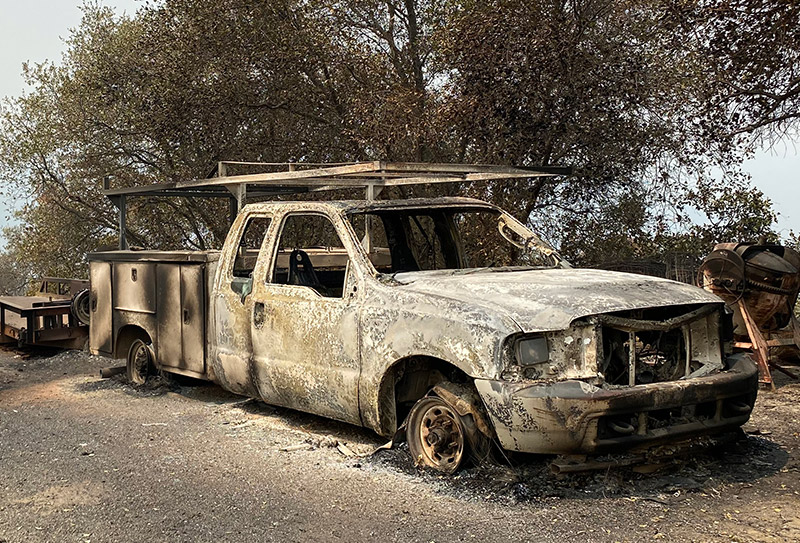
Quail Ridge director Shane Waddell was able to return to the area he and his family evacuated Tuesday night (Aug. 18), and found the director’s home “totally destroyed,” said Jeffrey Clary, associate director of the UC Davis Natural Reserves System.
The field station, researcher home and a studio apartment for faculty/principal investigators were still standing, apparently undamaged. Most of the reserve's Gator all-terrain vehicles also appeared to be OK
“His impression was that remaining infrastructure was not threatened by any smoldering fires,” Clary said. “On the drive, he observed that Stebbins Cold Canyon appeared to have completely burned on both slopes. There was too much smoke to see detail, however.”
Updated 2:35 p.m. Aug. 21: A new fire north of McLaughlin Reserve has trapped two reserve staffers — director Cathy Koehler and stewardship director Paul Aigner — and nearby neighbors in the area, UC Davis Natural Reserves Associate Director Jeffrey Clary said. He noted the area is relatively safe.
“The main facilities area at McLaughlin is large, graded, and free of vegetation,” Clary said. “It is therefore one of the safest places in the area to be in times of fire. As they have done in the past, Paul and Cathy are opening this part of the reserve to neighbors whose homes put them at greater risk.”
Clary said UC Davis could be a “good neighbor” by providing a safe haven.
Updated 11:50 a.m. Aug. 21: UC Davis Natural Reserves staff still don’t have word about whether many of their properties and research facilities were caught up in the flames of the LNU Lightning Complex, but everyone is safe and accounted for.
Jeffrey Clary, associate director of the reserves system, said staff helped neighbors evacuate as the fires approached.
“[Quail Ridge director] Shane Waddell alerted his neighbors to the approaching fire on Tuesday night,” Clary said. “[McLaughlin director] Cathy Koehler and [McLaughlin stewardship director] Paul Aigner worked with Barrick Mine staff and first responders to create fire breaks to guide fires away from sensitive areas.”
Their efforts were rewarded, as the McLaughlin Reserve appears to be out of danger, he said.
“Although significant portions of the natural lands there burned, major facilities and research projects were unscathed,” he said. “We lost one small bridge on one of the internal roads.”
While the status of other lands remains unknown, it is certain the Stebbins Cold Canyon Reserve will be closed to hikers for the forseeable future, Clary said.
Updated 9 a.m. Aug. 21: The School of Veterinary Medicine’s Veterinary Emergency Response Team, or VERT, deployed this morning to aid animals affected by the LNU Lightning Complex. The school also posted a video of a horse burned in the fires, now recovering on campus.
Fire response updates from the School of Veterinary Medicine.
Original post Aug. 20: UC Davis firefighters battled the LNU Lightning Complex on two fronts Wednesday (Aug. 19), saving homes in Vacaville and setting backfires outside Winters. Also Wednesday, the Veterinary Medical Teaching Hospital received its first patients from the LNU fires spanning five North Bay counties.
A lightning storm Monday (Aug. 17) set off multiple fires — all of which Cal fire has lumped together in what the agency calls a “complex.” As of this morning (Aug. 20), according to Cal Fire, flames had covered 131,000 acres — and there was zero containment.
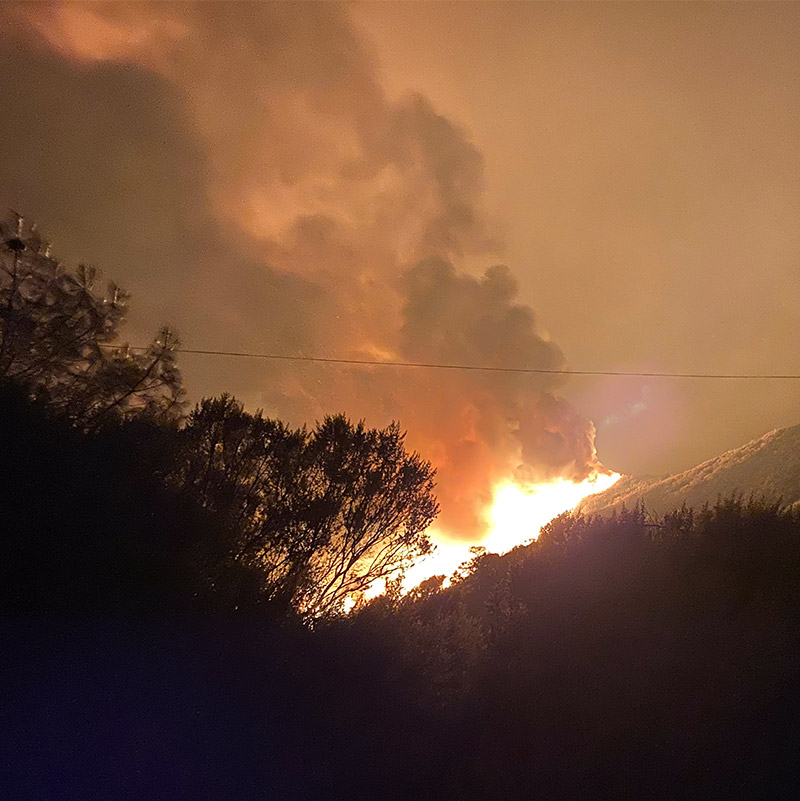
The UC Davis Natural Reserve System hoped to receive word today (Aug. 20) about three university properties on another side of the LNU Lightning Complex, near the south end of Lake Berryessa: Stebbins Cold Canyon Reserve, Cahill Riparian Preserve and Quail Ridge Reserve.
“Stebbins Cold Canyon and Cahill Riparian Preserve … are at the core of the burned area in Napa-Solano counties, so we expect that most of Stebbins burned,” Jeffrey Clary, associate director of the UC Davis Natural Reserve System, reported Wednesday night.
The same may be true for Quail Ridge Reserve. Shane Waddell, the reserve’s director, evacuated with his family earlier this week — and there is no word on the fate of their home or the Quail Ridge field station.
“In summary, we don’t know much,” Clark said. “It’s been a rough couple of days.”
The campus’s Engine 34 spent a day and a half battling the flames. The crew returned this morning from Winters.
“They were deployed to multiple locations with minimal support and were instrumental saving structures in Vacaville and in two firing operations in Winters off Highway 128,” Fire Chief Nate Trauernicht said.
Capt. Steve Dunn, who has been assigned to the Jones Fire west of Nevada City since Monday (Aug. 17), leading a strike team of fire crews from other agencies, is likely to be reassigned to the LNU Lightning Complex, Trauernicht said.
Campus resources
UC Davis employees were among the LNU Lightning Complex evacuees, and the university announced this morning that it was looking to be able to provide short-term emergency housing. An update was expected later today.
“Our UC Davis faculty, staff and students have been through so much this year, and now many in our community have faced further adversity brought on by the wildfires ravaging California,” officials said in this morning’s email. “Some have had their homes destroyed or damaged by fire, while others have been forced to leave their homes in mandatory evacuations, not knowing if those homes will be there when they return. And many of you are sheltering your family and friends who have been forced to evacuate.”
The message went on to outline available resources, including the Academic and Staff Assistance program, or ASAP; the Aggie Compass Basic Needs Center; and Student Health and Counseling Services.
See Supporting Employees During Wildfire Impacts.
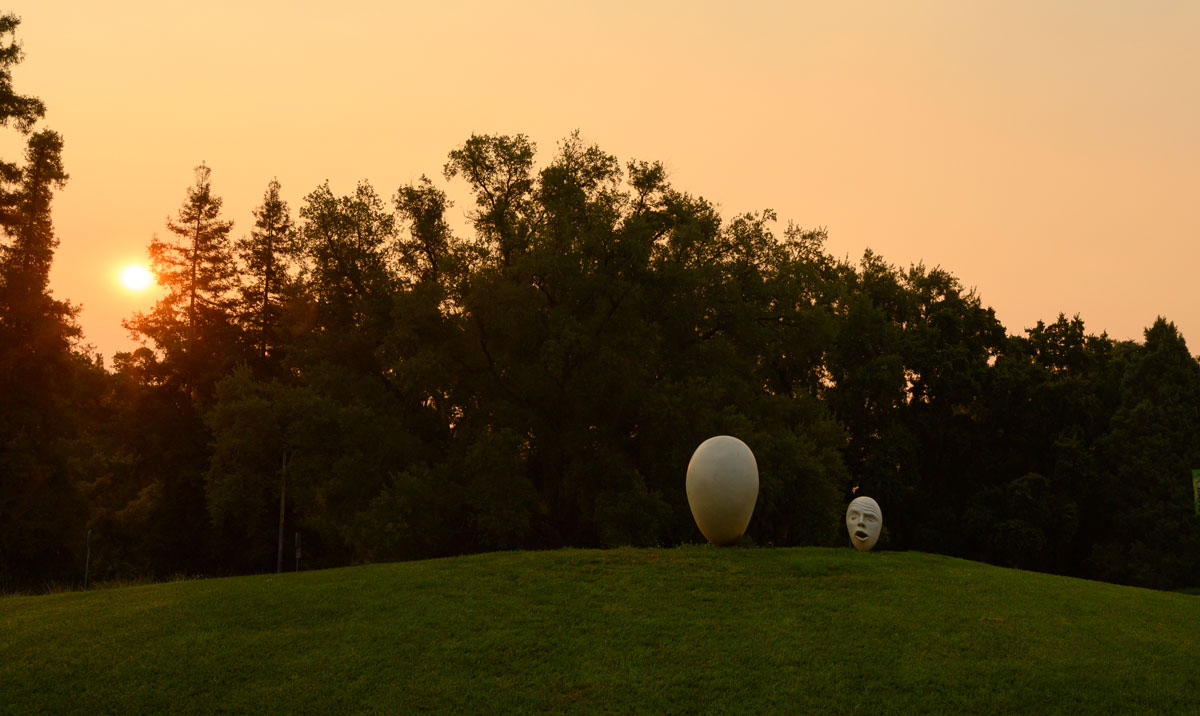
Air quality
Smoke and ash are taking a toll on air quality in Davis and elsewhere. At 2:15 p.m. today, the U.S. government’s AirNow reported air quality in Davis as “unhealthy for sensitive groups” — with particulate matter the primary pollutant — and predicted a "very unhealthy" reading by day’s end. AirNow predicted "very unhealthy" readings through the weekend.
AirNow, which bases its reports on the U.S. Environmental Protection Agency’s Air Quality Index, or AQI, is what UC Davis relies on during wildfire smoke events such as this one, to make decisions regarding campus operations. You can find the decision-making matrix on this page. UC Davis has responded to the current situation by limiting outdoor work/operations and providing outdoor workers with N-95 masks.
The Sacramento region’s Spare the Air monitoring system posted an AQI forecast of “very unhealthy” for today and through the weekend.
Due to the unhealthy air, Transportation Services announced that it had immediately removed some permit restrictions to allow permit holders to park closer to their work. So, if you have a C or L permit, you can park in an A-permit lot. This does not apply to spaces already restricted.
From UC Davis Health: “Protecting Yourself From Smoky Air”
At the veterinary hospital
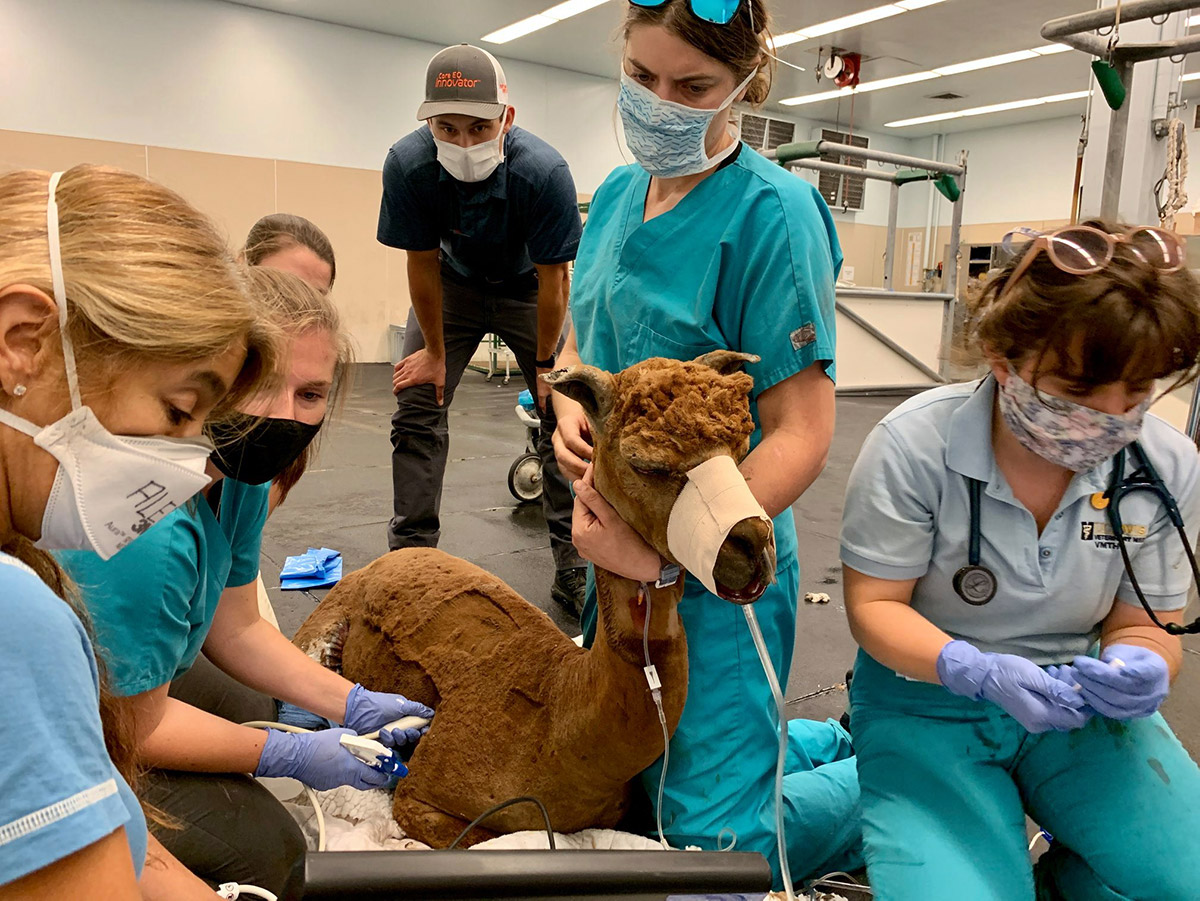
The School of Veterinary Medicine reported taking in three patients: an 11-year-old horse, a Welsh pony and an alpaca.
In a Facebook post, the school described the horse, Ava, as the sole survivor out of six horses owned by a woman in the Quail Canyon area who also lost her home and vehicle to the flames. The pony, Puzzler, belongs to a friend of Ava’s owner, and the alpaca was brought to the hospital after law enforcement officers asked passersby to load him in their truck. Hospital staff have dubbed the alpaca Canelo.
The School of Veterinary Medicine welcomes donations to its Catastrophic Need Fund to help care for animals like these.
In the south state
A four-person UC Davis crew aboard the Fire Department’s Brush Truck 34 has been battling the Ranch 2 Fire in the Angeles National Forest. The U.S. Forest Service reported today that the fire had burned 4,237 acres and was 33 percent contained.
Brush 34 and its crew — Paul Rush, captain; Corrie Beall, engineer; and Cara Martinez and Christopher Hay, firefighters — left campus Aug. 13, originally assigned to the Lake Fire north of Santa Clarita, then moved to the Ranch2 Fire on Sunday (Aug. 16).
Chief Trauernicht said the crew had been assigned a rest day today, before being sent home.
